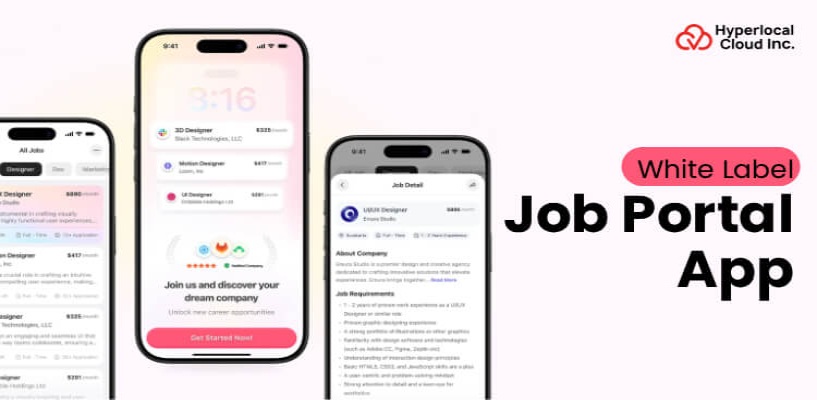White Label Job Portal App Solution

The job portal apps in the US in 2025 have undergone a major technological transformation, which includes AI and automation. These apps are delivering a platform for employers and job seekers. The change has completely altered the hiring landscape of the present day, as it makes the talent acquisition process more efficient.
Through utilizing a white label job portal app, businesses can easily match up with these market trends and provide the hiring process of the future, which is efficient and modern. The businesses can then rebrand this solution and use it as their own recruitment application. A white label job portal app is a platform that has already been designed, is customizable, and is built by a third party.
Understanding the Job Portal App
A job portal app is an online platform connecting job seekers with employers. It serves as a digital marketplace where companies post job openings, and candidates search, apply, and track applications. These apps typically offer features like profile creation, resume uploads, job filters, notifications, and application management. The goal is to streamline the recruitment process by matching the right candidates to the right jobs efficiently. For users, it provides access to numerous opportunities in one place. For employers, it simplifies candidate sourcing and screening, saving time and resources while expanding their reach to a broader talent pool.
Want a Job Portal That Reflects Your Brand?
How Does the Job Portal App Streamline the Process?
The job portal app simplifies the whole method and is able to align candidates with suitable vacancies, thereby making the overall hiring process easier for both sides. Here is the explanation about the job portal app functionality in detail from the perspective of job seekers and employers:
For Job Seekers
Profile Creation: Once they have the app on their phone, users can make their profile with just a few clicks. To complete the profile, they should provide their educational background, skills, work experience, etc.
Resume Management: Candidates can put their resumes on the platform for easy application, or they can make one from scratch by using the templates offered within the application.
Job Search & Filtering: The application includes an easy-to-operate interface, and candidates are allowed to use the search bar and filter settings such as location, skills, industry, job type, etc. This lets them come across a suitable position and makes the application process more accessible.
Application: The candidates, after finding suitable jobs, can effortlessly put in their application to the job in just a few steps without any inconvenience.
Notifications: Job seekers get timely alerts about the new job openings that best fit their skills, experience, location, etc. The app also assists them by notifying them of the changes in their application process.
For Employers
Company Profile: To build up the company profile, the hiring managers are required to provide the necessary details, presenting their brand and company, thereby displaying trust among the job seekers.
Job Posting: A company can publish its job vacancies more simply through the app after the profile has been created. Just by giving the application details and descriptions, a company can release job vacancies.
Candidate Search: Using the app, employers can also search for candidates actively. They can search by using keywords and specific skills.
Application Management: Employers can receive and manage the applications using the app and can also track the progress of each and every candidate who applied.
Why a White Label Job Portal App is a Smart Investment?
If you are a company who have invested in building an app from scratch, you know that it takes months or years to develop an app, requires a lot of investment, bug fixes, maintenance, and security updates. Developing a job portal app by using a white label solution, you can skip all this hassle and get straight to business. Why does it actually make sense? To know, read below!
Reduced Costs and Time
It does not require building a job portal from scratch with the massive costs and the long development time. Instead, it is a pre-built and ready-to-use solution.
Quick Market Entry
Instead of creating your branded job portal in months, you can now do it in minutes. Thus, you will be able to take advantage of market opportunities faster.
Full Customization and Branding
By just changing the logo and the color, businesses can have a totally different and unique app that will also feature a consistent brand experience for users.
Focus on Core Business
Companies can utilize this solution for the job portal app. All the technical work, such as maintenance, server management, and bug fixes, is done by the third party, and you only need to focus on the core business.
Scalability and Flexibility
It would be a good option for businesses that vary in size, due to its flexible infrastructure and scalable pricing models.
Monetization Opportunities
The software is very likely to come with various kinds of monetization opportunities, such as paid job postings, featured listings, and subscription-based access for employers.
Enhanced User Experience
Employ AI-powered candidate matching and automated hiring to make it as easy as a snap for job seekers as well as employers to get a hold of better solutions.
Consistent Branding
By maintaining a cohesive professional image across all recruitment efforts, companies can strengthen their brand’s reputation.
Mobile-First Capabilities
Creating a user-friendly, easy-to-use mobile version for the job seeker is really beneficial because a great number of candidates access the job portals directly from their smartphones.
What Essential Features Should Every Job Portal App Include?
An efficient job portal app typically has several features that make the process easier for both job seekers and employers. Have a look at what kind of features it includes:
Features for Job Seekers
User Registration & Profiles: The registration process should be simple, and it should include a social media integration option. The profile should be a set of skills and experience that are easily identifiable.
Smart Job Search & Filters: The prime feature of the job portal is job searching. It must be advanced and should include filters such as location, experience level, industry, and salary.
Job Alerts & Notifications: These are excellent tools in every job portal to keep the user updated on new job vacancies that match their requirements. A push notification is sent to the user immediately after a suitable job is put up.
Resume Builder: The in-app tools with pre-designed formats assist in the creation and management of professional and updated resumes.
Application Tracking System (ATS): The ability to monitor the progress of job applications, starting from delivery to interview stages.
Saved Jobs: A function that allows users to store exciting job postings to return later.
In-App Communication: Chat and messaging functionalities that facilitate contact between the user and the recruiter or employer.
Features for Employers
Job Posting: The app provides a medium where employers can share comprehensive job descriptions along with all the relevant details.
Candidate Search & Filtering: The powerful search feature allows employers to find and filter resumes based on candidates’ skills, prior work experience, and location.
Resume Management: The set of tools for managing, downloading, and reviewing the submitted resumes.
Application Tracking: A seamlessly connected system that keeps track of candidate progress and assists in job application management.
Interview Scheduling: This feature helps employers to schedule interviews. It also helps to know about the candidate’s availability.
Company Profiles: This feature helps employers build a comprehensive company profile to communicate the company’s culture, services, and growth.
For Admin
Dashboard: It offers admins a centralized view of the key performance indicators (KPIs), such as job listings, user activity, and overall performance of the portal.
User Management: The feature enables administrators to make decisions on whether to allow, disallow, or manage the profiles of job seekers and employers.
Job Ad Management: The admin can supervise, authorize, alter, and regulate all job postings along with their associated details.
Content Management System (CMS): Using this feature, the admin can manage static pages, blog posts, FAQs, testimonials, and other site content.
Payment & Subscription Management: The admin is responsible for handling all transactions, subscription plans, and membership details for users and employers.
Real-time Analytics & Reporting: This tool allows admins to monitor user behaviors, identify trends, and overall platform performance to guide decision-making.
Ready to Launch Your Job Portal?
What AI-Powered Features Make a Job Portal More Effective?
Several AI-powered features are available that businesses can use to automate their job portal app, offering a seamless experience to both candidates and employers. Some of them are described below:
Personalized Job Recommendations
Machine learning looks at candidates’ talent, prior experience, and preferences and then shows the most suitable job openings, thereby cutting a lot of time.
AI-Generated Resumes and Cover Letters
It creates and upgrades resumes and cover letters. Then, it ensures the candidates’ compatibility with the job and uses keyword-thematic customization for a particular job application.
Automated Job Application
Artificial intelligence is capable of automatically completing job applications, and, along with that, it can also send applications on behalf of candidates.
AI Interview Practice
Provides job seekers with AI-created interviews and instant feedback to help gain confidence and enhance performance.
Virtual Career Coach
Delivers tailored advice and encouragement during the entire procedure of looking for a job.
Skill and Salary Insights
Recommends career-related skill deficits and offers salary forecasts based on job titles and tenure.
Streamlined Recruitment
AI facilitates the initial screening process, where it goes through hundreds of resumes and selects the most qualified candidates in no time.
Better Candidate Matching
The use of algorithmic methods makes it possible to compare the skills and experience of candidates to the requirements of the job, thus making the hiring of the right candidate easier.
AI Chatbots
Work as virtual helpers for the candidates, giving them answers to the common questions instantly. They also help by making the candidate experience better.
Analytics Dashboards
This dashboard provides data-driven insights into the recruitment process and market trends related to the job.
Automated Job Scraping
Collects new job vacancies from different channels to have a job database that is always up to date.
What Is the Step-by-Step Process to Develop a Job Portal App?
Building a robust job portal app requires a professional mobile app development team. The following are the steps to be followed to develop a future-proof and efficient app:
Market Research
In this first step of development, the developers ask you to understand your business goals, target audience needs, requirements, niche, etc. Later on, the team started their own research to understand the local regulations, market trends, and competitors. In this step, they also define the features of the app, revenue model, and value propositions. This helps ensure that the application being developed helps grow your business rapidly in the industry.
App Design
Moving further, the second step requires a team of highly talented and creative designers who plan to develop an interactive interface that offers users a streamlined experience. The designers do prototyping, wireframing, and craft a user flow that will ensure smoother navigation, better accessibility, and a simplified experience.
Development Phase
Generally, there are two ways in which the development team builds the job portal app:
Custom-based Solution – With a white-label solution, the development team starts with an existing job portal platform or software that can be quickly customized and branded for the client. This approach offers maximum customization and control but typically requires more time and higher investment.
White-label Solution – Here, the development team offers you a pre-built solution that includes all the essential functionalities. You don’t need to wait for the complete development process. Businesses can customize this app based on their brand requirements and rebrand it under their name. This method reduces development time and cost significantly, but offers limited customization compared to the custom-built solution.
Test and Quality Assurance
In this step, the QA team will test the application in both manual and automatic ways. They go through the app’s security measures, features, and performance on different devices. After that, the team works on fixing the bugs and making the required changes so that the application performs better without any glitches.
App Launch
In the end, the app is launched on the dedicated platforms like the Apple Store and the Google Play Store. It is ensured by the team that all the necessary guidelines and regulations are followed to run the application smoothly on different devices. Even after the launch, the team offers maintenance services like feature addition, error mitigation, and server upgrades for future growth.
Which Technologies are Used to Build a Job Portal App?
In order to build a job portal app, using the right tech stack is essential. Below are the technologies used in developing a job portal app:
| Component | Tech Stack |
| Frontend | React, Next.js, Redux, React Native, Tailwind CSS, or Material-UI |
| Backend | Node.js with Express.js, Java Spring Boot, FastAPI, or Flask |
| Database | PostgreSQL or MySQL, MongoDB, Redis |
| Payment Gateway | Stripe, PayPal, Razorpay |
| Cloud Platforms | AWS, Docker, Kubernetes, Cloudflare, or AWS CloudFront |
| Push notifications | Firebase Cloud Messaging (FCM) |
| APIs | Google Maps API |
Grow Your Job Board Business with Our White Label Solution
Real-World Use Cases of Job Portal Apps You Should Know
You may be wondering now who actually benefits from using this job portal app. Turns out that some of the industries have cracked the code and are using this platform. Let’s discuss that!
Staffing and Recruitment Agencies
Placement agencies that focus on employee hiring can use a job portal app to simplify their recruitment process, enrich their candidate pool, and provide employer-specific services.
IT and Software Companies
IT & software companies can develop such platforms that specifically deal with the tech industry, providing automated recruitment, specialized hiring for tech roles, and candidate assessment.
E-commerce Businesses
Big e-commerce platforms or retailers that have a lot of hiring needs can develop their own job portals to attract and manage their workforce, which could be from entry-level positions to highly skilled roles.
EdTech and Training Providers
The companies that provide educational courses and skill development should definitely consider job portals in order to establish a connection between skilled individuals and employers. This way, they can fuel their income with training course enrollments or certifications.
Niche Industry Providers
Job portals are able to narrow down their target to only one particular sector, for instance, finance, healthcare, or manufacturing. Then, they could build specialized platforms that attract the most suitable and talented people to these industries.
Business Support Services
The companies that provide business process outsourcing (BPO) and human resources consulting services can make use of job portal apps to get in touch with clients and offer their services to employers who need to fill different positions.
What Are the Revenue Sources for Job Portal Apps?
Businesses or startups can make money from a job portal app by implementing the following revenue streams:
Paid Job Postings
Make an agreement with a company that they will pay you every time they post a new job listing on your app. It would also be great if you could offer a subscription plan that would let them post as many jobs as they want for a certain period.
Featured Listings
Besides the regular listing fee, employers can be allowed to pay a certain additional amount for the job offers to be exposed more. For example, listings will be in the first positions of the search or will be displayed in app sections designed for high visibility, and thus, more applications will be received.
Subscription Services for Employers
Provide employers with different subscription plan levels that grant access to various features, i.e., advanced search filters, applicant tracking tools, and candidate profile insights.
Resume Database Access
Businesses can charge employers and recruiting agencies for offering them the resume database of candidates and contact information.
In-App Advertising
Allow third-party ads, for instance, Google AdSense, to be installed in your app. From banner ads, sponsored posts, or interstitial ads shown to job seekers, you can make passive income.
Premium Accounts for Job Seekers
Offer premium features via paid subscriptions, which might include profile highlighting, advanced job alerts, access to exclusive job postings, and the help of a resume writer, etc.
Employer Branding Services
Charge companies to offer them brand exposure on the job portal app, for example, offer them featured employer listings on the home page of your app or in the “Top Employers” section.
Affiliate Marketing
Connect with other related businesses, such as educational resources or training platforms, and get paid a percentage of the sales for the referrals you make.
Recruitment Services/Commissions
Within your app, act as a recruitment agency and charge a commission on the successful hirings that are made using your job portal app.
Data Monetization
Businesses can generate income by providing companies with API access to their job listings and candidate databases, thus allowing them to incorporate this data into their own platforms.
Affordable Job Portal App Development with White Label Solutions
The cost for creating a job portal app with a white label solution usually starts at $6,000. The final amount is mainly based on the additional features a business would like to include in the application; therefore, this figure is only a rough estimate.
A large number of software development companies decide to implement one of the two most common approaches: either by using a white-label solution or by creating a platform from scratch.
Apart from that, other things like how complex the platform is, the kind of design and user experience a business wants, the project timeline, the team’s skills, the use of AI features, and any third-party integrations will also affect the overall price.
Launch Your Own Job Portal in Days.
What Sets Hyperlocal Cloud Apart in Developing Job Portal Apps?
Being an on-demand app development company, Hyperlocal Cloud offers a feature-rich and powerful solution for your job portal app. Our experience in building such white label solutions ensures that your app is secure, scalable, and ready for the future.
We offer businesses affordable solutions, offering modern features at the same time, to meet their business requirements. Our expert team follows a simple process and provides ongoing support to keep your platform bug-free and up-to-date. Contact us today for more details!





